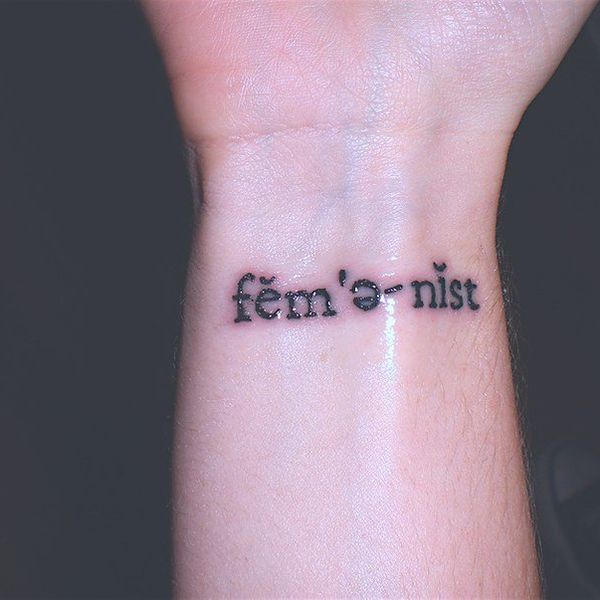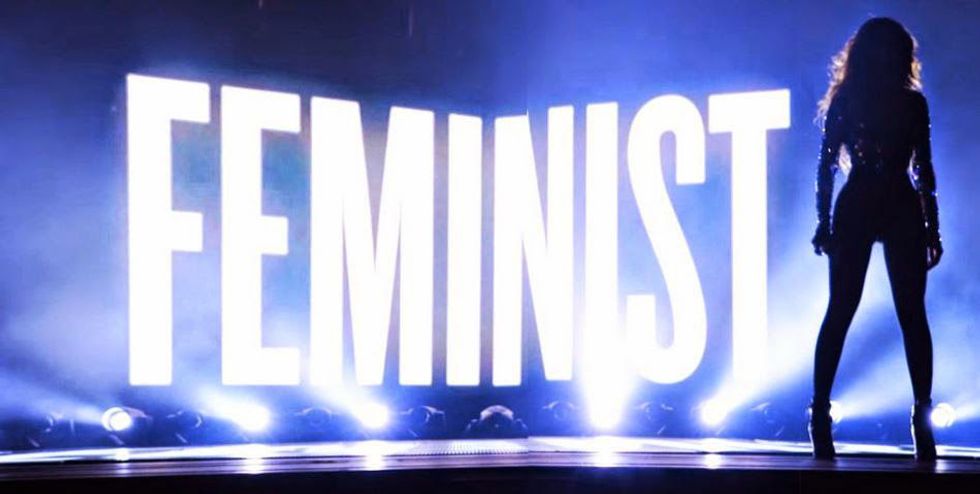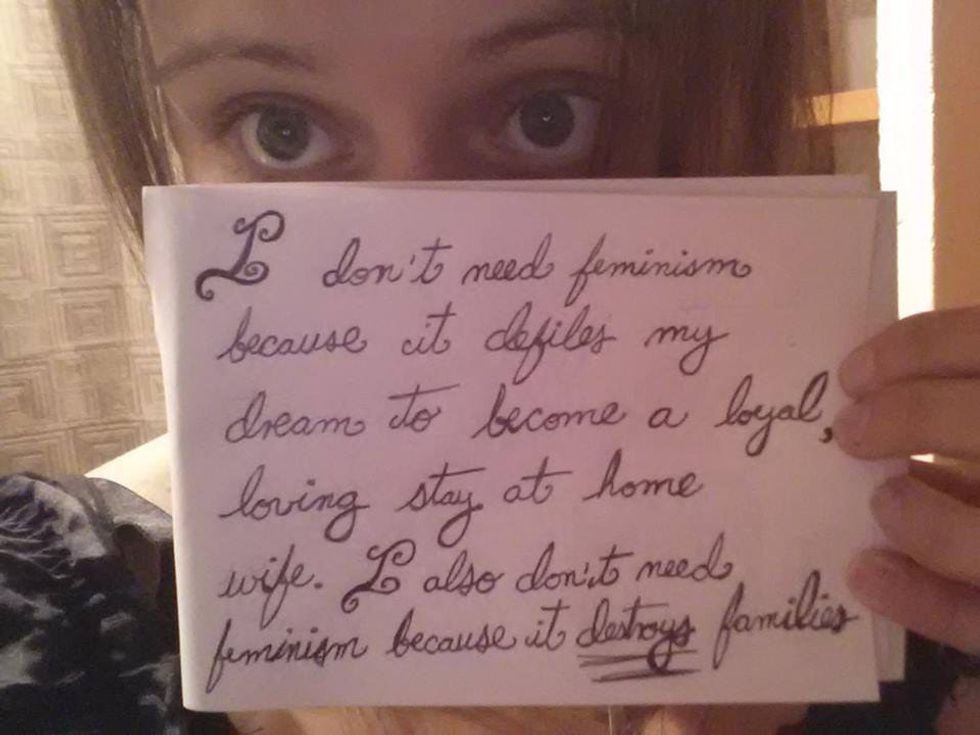If you want to make feminism a simple subject, it can be. Feminism, by definition, is advocating social, political and all other rights of women equal to those of men. However, that broad spectrum of feminism doesn't even begin to cover all of the sub-sectors: new wave feminism, radical feminism, white feminism and black feminism. These are all categories under the very broad term "feminism," and when we truly analyze feminism, it's not as simple as its definition.
Feminism can be quite simple when looking at political and economic factors. The statistic is that women make only 77 cents on the dollar. Some will argue that on the aggregate, men tend to work more hours, but that still only makes for women earning 88 cents on the dollar with the hour gap. People also always tend to throw marriage and children into the pay gap argument - which is obviously not an argument because it takes two to have children and get married, meaning men theoretically are facing the same problem. So, when comparing a single working woman with no children to a man, she still is only making 96 cents on the dollar. Is that better than 77 cents? Yes, but why isn't it just the same?
The same goes for politics. Women only make up about 20 percent of the head count, whether it be seats in the house, senators or mayors, not to mention that there has never been a female president. Why aren't women being represented more in politics when they make up 50.8 percent of the population?
A prime example is when people get angry over the fact that women may take into consideration the gender of Hillary Clinton when deciding to vote for her or not, because she represents them. However, men, white men specifically, have been voting for men their entire lives without complaint from anyone that they're only siding with their gender.
The examples go on and on when it comes to political and economic issues. These issues could be solvable if we bothered to make them a priority, but when the people in power gain benefits from being in power, it's hard to convince them it's best to give power away, no matter how fair or equal it may be. But this isn't the problem.
The problem when we talk about feminism is social factors, because what we are really talking about are gender roles and breaking them. However, does enjoying your gender role make you any less of a feminist? When we berate those that claim they're not feminist, do we ever stop to think that they enjoy aspects of their gender role and don't necessarily want to break those molds?
This is where the definition of feminism gets tough. Is feminism actually breaking from your traditional role, or is it just giving you the power to do so if you please without judgement? I would say the latter, but the way we treat women who feel this way says differently.
In today's society when a woman's main goal in life is to get married, have children and be the caregiver who cooks, cleans and does the shopping, we tend to look down on them. We say things like, "they went to college to get their 'Mrs. Degree'" and that women like this aren't empowering other women to be more than just caregivers.
That isn't really what feminism is though. Feminism just means that a women can be the "breadwinner" of her family if she wishes, and that a man can be the "caregiver" of his family if he wishes. Feminism is the ability to switch gender roles without judgement, not necessarily that you have to abandon gender roles.
One of the toughest questions we could ask is that if we truly believe in equality in all forms. If there was to be a draft, shouldn't women as well as men both be drafted into the military? Well, theoretically, yes.
Is that what I want? No.
As a woman, there are things that I'm not expected to do, and quite frankly things I don't want to do, like fight in a war. I'm not expected to mow my lawn, and I never plan to. I'm not really expected to take out the trash or kill the spiders in my house or do anything that involves touching a hammer or doing maintenance to my car.
Am I capable of doing all of these things? Sure, and I will if I have to, but if it continues to be a "man's job," I'm not even sure that I care, and quite frankly I don't want to do it myself anyway. So when we have a very large group of women claiming not to be feminist, it's because very radical forms of feminism have shifted to make women believe that they have to radically change to be a feminist and abandon shaving their legs and start working in male-dominated fields instead of being caregivers.
But again, this isn't feminism. Feminism is that women can and should have the same opportunities as men, even in male dominated fields. There shouldn't be a glass ceiling to overcome to get somewhere. That doesn't mean you can't still be a feminist while pursuing traditional female dominated careers, like teaching or nursing. It doesn't mean you're not a feminist if you just want to be a wife and a mother. What makes you a feminist is advocating for the men who only want to be husbands and fathers.
In a way, feminism is about stripping away social gender norms. The problem is that a lot of those norms are a part of a person's identity. As an example, we can take a look at Beyonce, one of the biggest self-proclaimed feminist. Yet still, the problem many have with Beyonce is that she benefits from fitting into the traditional role of a beautiful, feminine women. But you can be a feminist and enjoy being feminine.
For example, some find it annoying and utterly misogynistic, but I quite like that men bend backwards to hold a door open for me. Yes, I can open a door by myself, but when someone holds a door open for me, I don't assume they think I'm too fragile to open my own door. I assume that they were raised to believe that opening a door for a female is polite and respectful. Does it make me less of a feminist to enjoy such a basic gender norm?
So here lies the problem of feminism, at least feminism on the social front: we are throwing an ideology down women's throats that they may not even believe in. We are telling women that they don't have to paint their nails or shave their bodies or wear pink or play with Barbies. And yes, of course, women don't have to, but what we're not telling women is that it's okay if they want to. It's okay to like your social gender norms. If your favorite color is pink, there's glitter everywhere and there's no way in hell you're mowing the lawn because you might break a nail, and that's what empowers you, then we shouldn't berate that.
We have pushed the feminist movement to the point where we are making women believe that feminism means leaving traditional norms. When we talk about feminism we need to make a point to include the women who aren't breaking gender norms. Empowering the girl who wants to be a scientist doesn't mean berating the girl who wants to be a mom. Encouraging the man who wants to be a caregiver doesn't mean putting down the man who wants to be the breadwinner. The point of feminism is that there is no right or wrong gender role. It means advocating for everyone to have the same opportunities.
More importantly, we have to remember that feminism is for all, not just those who match our values. This is a mistake I was making, and a mistake so many of us are making. This is the mistake the makes people hate feminism. Let's remember what we're actually fighting for.

























